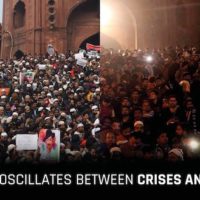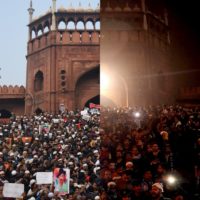-
What passes for reality is not worth respecting
In October of last year, the International Monetary Fund (IMF) released its flagship World Economic Outlook. In that report, the IMF said that the global growth rate would stumble at 3% in 2019. A month ago, the IMF’s main economists returned to this theme; ‘Global growth’, they wrote, ‘recorded its weakest pace since the global financial crisis a decade ago’.
-
Is this the end of U.S. interference in West Asia?
Iran’s Foreign Minister Javad Zarif reacted strongly to U.S. Secretary of State Mike Pompeo’s suggestion that Iraqis were “dancing in the street” to celebrate the assassination. On Twitter, Zarif posted pictures of the funeral procession for Soleimani and wrote, “End of U.S. malign presence in West Asia has begun.”
-
Dossier 24: The world oscillates between crises and protests
This dossier is dedicated to offering an assessment of the moment we find ourselves in today. Part 1 provides a quick overview of planetary affairs; and Part 2 there are more detailed reports from our offices on their respective regions: South Africa, India, as well as the Caribbean and Latin America.
-
A tale of two murals
No-one on Berlin’s main eastbound traffic artery could miss one of the two murals, five stories high, 2745 square feet in area, in shiny bright, red, green, yellow and blue colors up to the gabled rooftop of an older, isolated apartment building.
-
How Trump got himself into a World of trouble in Iraq
It’s a new year, and the U.S. has found a new enemy—an Iraqi militia called Kata’ib Hezbollah. How tragically predictable was that? So who or what is Kata’ib Hezbollah? Why are U.S. forces attacking it? And where will this lead?
-
A culture of reconciliation with nature
Christopher Caudwell, who died at age 29 fighting with the International Brigades in the Spanish Civil War, wrote: “Either the devil has come amongst us having great power, or there is a causal explanation for a disease common to economics, science, and art.” That disease, he recognized, was the self-alienation of humanity under capitalism
-
The Last Earth: A People’s History of Palestine
This article is a book review of Ramzy Baroud’s The Last Earth: A Palestinian Story. Published in 2018, The Last Earth documents the lives of ordinary Palestinians and their battle against Israeli occupation. In the process of telling their stories, Baroud shows that the Palestinians not as passive victims of Israeli colonialism but as active participants in their struggle for a free Palestine, reminding readers that only the Palestinian people can bring about true change in the region.
-
India’s Government is going to war against its own people
On December 13, the United Nations high commissioner for human rights released a powerful statement that criticized India’s new citizenship law. This “fundamentally discriminatory” Citizenship (Amendment) Act of 2019 would expedite citizenship for persecuted religious minorities from India’s neighboring countries. But in the list of those minorities, it names only Hindus, Sikhs, Buddhists, Jains, Parsis, and Christians.
-
Making sense of a shattering defeat
As soon as the scale of Labour’s shattering defeat began to emerge last night, pundits began to push the line that this was not just about Brexit but about Jeremy Corbyn and the shift towards socialism. No election is just about one issue—but the evidence backs up the argument that Brexit was the defining factor.
-
The British establishment is very afraid of a Corbyn victory
The negative media barrage on Corbyn and Labour in the UK has been incessant but if Corbyn were to succeed it would be a major boost to the Sanders campaign in the U.S.
-
U.S. and allies target Cuba’s overseas medical missions
Three rightwing Latin American governments have forced out Cuban doctors at work in their countries. What they and the US government object to is the revolutionary vision and revolutionary praxis that they represent.
-
Rap Brown Law today
The law was popularly named for African-American leader H. “Rap” Brown; its formal title was “The Civil Obedience Act of 1968.”
-
Dossier 23: Peace, neoliberalism and political shifts in Colombia
Once again, the people of Colombia straddle two realities–the drums of war and the hope of peace. This tension has along, complex, and multi-dimensional historical process. This dossier from Tricontinental: Institute for Social Research examines the root causes of the crisis and the two realities of war and peace.
-
Big rallies and big differences
Looking out my window at the wide Karl Marx Allee boulevard below, I have seen many a big May Day parade march by in the old GDR days, and many a passing bicycle race or Marathon. Recently, for the first time, I saw a slow, endless column of green or yellow tractors.
-
How to commit war crimes—and get away with it
U.S. President Donald Trump sacked his Navy secretary on Twitter because he did not follow Trump’s advice and retain Navy Special Warfare Operator Edward Gallagher, despite Gallagher being accused of stabbing to death a wounded fighter, of murdering a schoolgirl and an elderly man, and then of obstructing justice.
-
Marx, dead and alive
“It’s really interesting, isn’t it, how certain people would want to go to such lengths to smash Marx. Do they really think they’re going to destroy the ideas by destroying the grave? …people feel so afraid of Marx. Is there any other intellectual throughout history that is like that?”
-
Evidence talks: U.S. government propelled coup in Bolivia
A coup on November 10 removed the socialist government of Bolivian President Evo Morales. The trail of evidence—from money flows to U.S. influence within the Bolivian military, and U.S. control of the Organization of American States (OAS)—leaves little doubt that the U.S. government made preparations and orchestrated the final stages of the coup.
-
A letter to intellectuals who deride revolutions in the name of purity
The ‘stubborn class struggle’ inside the revolutionary process should provide someone who is not part of the revolutionary process itself to be sympathetic not to this or that policy of a government, but to the difficulty—and necessity—of the process itself.
-
Working Document 2: The fate of Xolobeni would be the fate of us all
Since 1996, activists in Xolobeni, a coastal region in South Africa, have been fighting a foreign mining conglomerate that learned that their ancestral lands happen to be rich in titanium. The anti-mining activists of Xolobeni, who have lost many comrades to hit squads, continue to struggle against this foreign company and its partners in the South African government. Given that their land is located in a global biodiversity hotspot, their struggle is the struggle of us all: it is the fight for water, soil, food, and air.
-
The coup in Bolivia has everything to do with the screen you’re using to read this
The nationalization efforts of Evo Morales ensured that the State controlled 51 percent of all private energy firms that operated in Bolivia, which allowed the State’s coffers to fill rapidly. It was this money that was invested to go after poverty, hunger, and illiteracy.



















